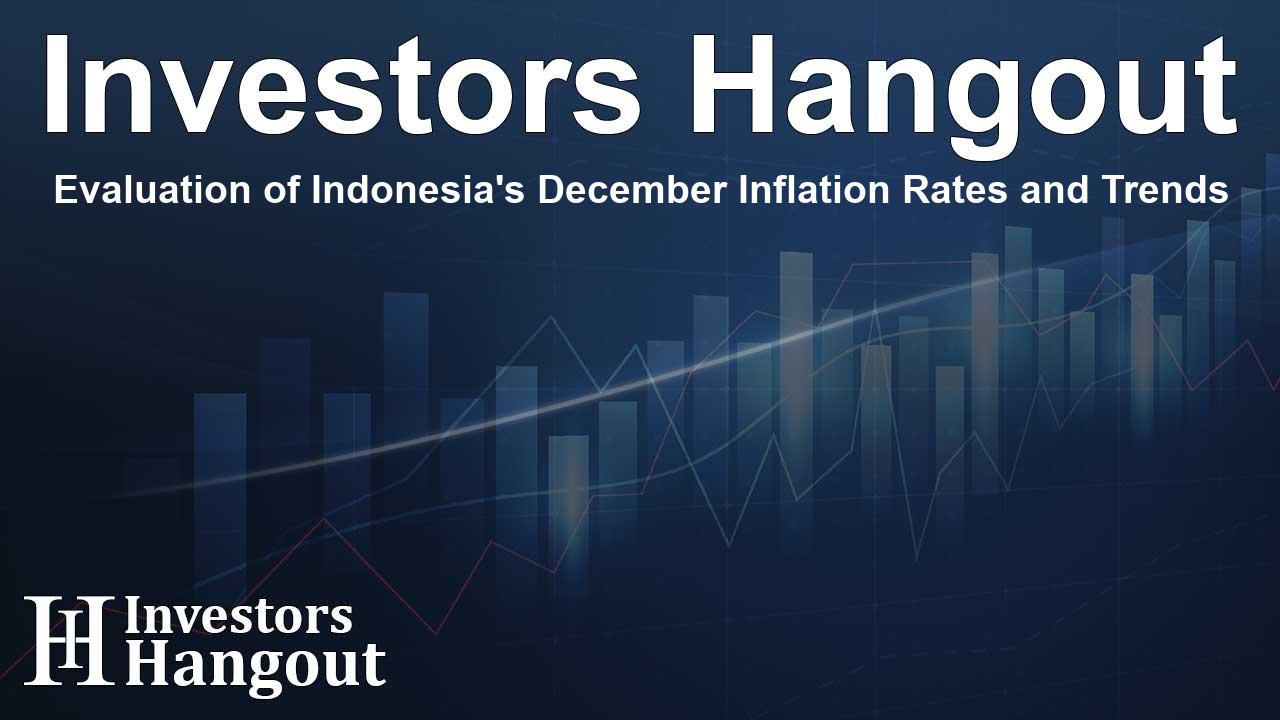Evaluation of Indonesia's December Inflation Rates and Trends

Indonesia's Inflation Overview for December
The annual inflation rate in Indonesia for December stood at 1.57%, demonstrating minimal movement from 1.55% in the preceding month. This figure closely aligns with the expectations of economists, whose estimates hovered around 1.60% according to a Reuters poll.
Core Inflation Insights
When examining core inflation, which excludes government-regulated prices and volatile food costs, the rate remained constant at 2.26%. This figure matches November's rate and is nearly in line with the forecast of 2.28% set by economic analysts.
Central Bank's Inflation Target
Bank Indonesia, the nation's central bank, has established an inflation target range for the years 2024 and 2025, aiming for rates between 1.5% to 3.5%. This proactive approach is intended to stabilize the economy and encourage growth.
Monetary Policy and Economic Monitoring
Policymakers at Bank Indonesia have emphasized the importance of observing global economic trends to decide the optimal timing for further monetary policy easing. Although the central bank initially cut interest rates in September, they have since opted to pause these reductions due to ongoing financial market uncertainty and depreciation concerns surrounding the rupiah currency.
The Impact of Global Developments
The interactions between global market conditions and domestic economic indicators are critical. Bank Indonesia's monitoring efforts are pivotal for maintaining a balanced and responsive monetary framework.
The Role of Financial Market Conditions
With inflation rates lingering near the lower end of their targeted range, the bank faces challenges related to market volatility. The decision to hold off on further rate cuts signifies caution amidst fluctuating economic signals.
Future Inflationary Trends
As we move into the new year, the projected inflation dynamics will continue to play a significant role in shaping monetary policy and economic predictions. Stakeholders will be keen observers of how these rates evolve in response to both domestic policies and international economic developments.
Rupiah Currency and Its Implications
The stability of the rupiah remains a concern for the central bank as fluctuations can impact imported inflation and ultimately affect the overall economic landscape. Policymakers are keenly aware of these challenges and aim to uphold currency stability moving forward.
Frequently Asked Questions
What was Indonesia's inflation rate in December?
Indonesia's inflation rate for December was recorded at 1.57% year-on-year.
What is the core inflation rate for December?
The core inflation rate for December was stable at 2.26%, the same as November.
What inflation targets has Bank Indonesia set for 2024-2025?
Bank Indonesia has targeted an inflation range of 1.5% to 3.5% for the years 2024 and 2025.
Why does Bank Indonesia pause on interest rate cuts?
The pause on interest rate cuts is due to financial market volatility and concerns over the rupiah's performance.
How does global economic stability affect Indonesia's inflation?
Global economic conditions are monitored closely, as they influence domestic inflation rates and the central bank's policy decisions.
About Investors Hangout
Investors Hangout is a leading online stock forum for financial discussion and learning, offering a wide range of free tools and resources. It draws in traders of all levels, who exchange market knowledge, investigate trading tactics, and keep an eye on industry developments in real time. Featuring financial articles, stock message boards, quotes, charts, company profiles, and live news updates. Through cooperative learning and a wealth of informational resources, it helps users from novices creating their first portfolios to experts honing their techniques. Join Investors Hangout today: https://investorshangout.com/
Disclaimer: The content of this article is solely for general informational purposes only; it does not represent legal, financial, or investment advice. Investors Hangout does not offer financial advice; the author is not a licensed financial advisor. Consult a qualified advisor before making any financial or investment decisions based on this article. The author's interpretation of publicly available data shapes the opinions presented here; as a result, they should not be taken as advice to purchase, sell, or hold any securities mentioned or any other investments. The author does not guarantee the accuracy, completeness, or timeliness of any material, providing it "as is." Information and market conditions may change; past performance is not indicative of future outcomes. If any of the material offered here is inaccurate, please contact us for corrections.